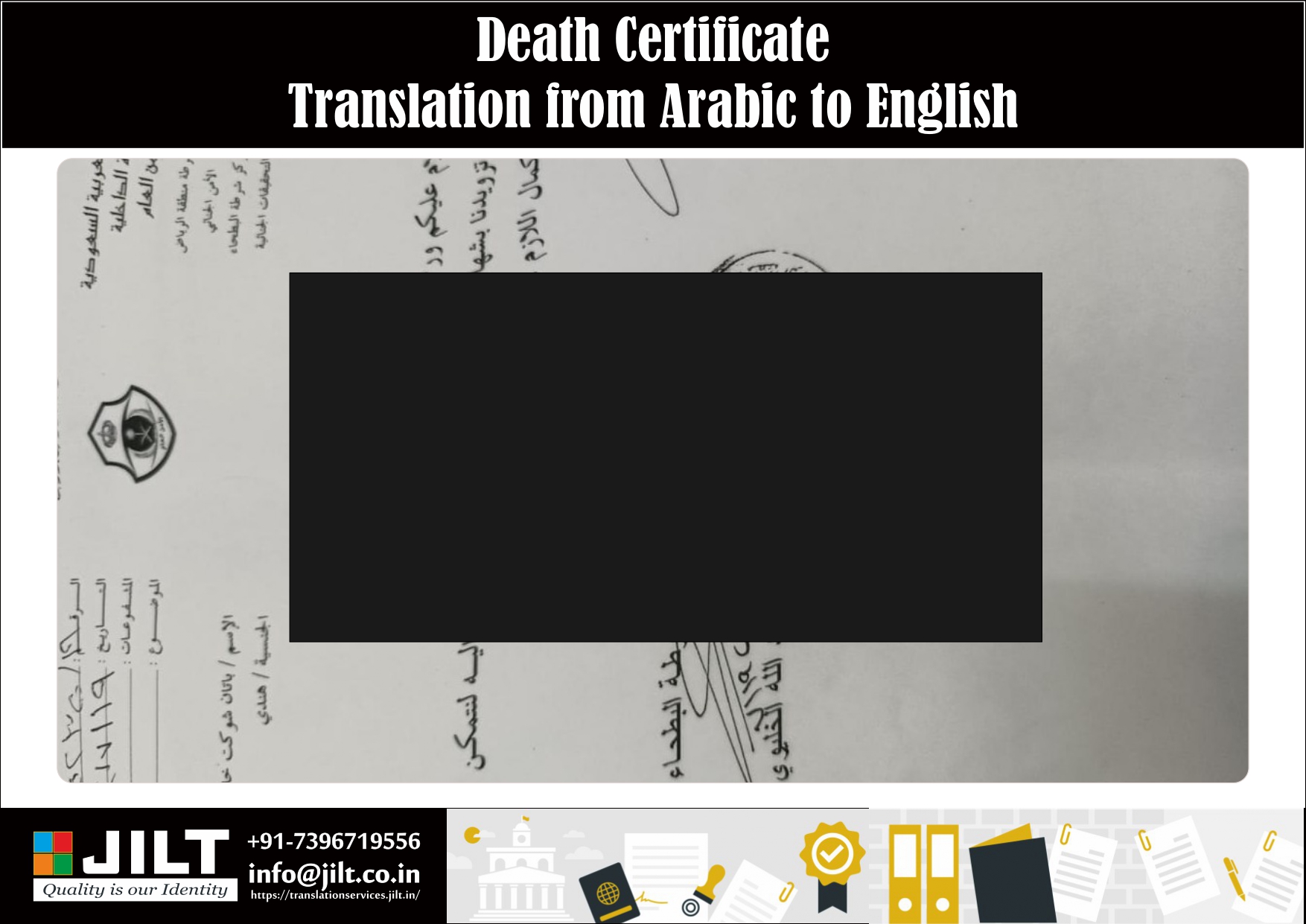
THE VITAL ROLE OF DEATH CERTIFICATE TRANSLATION FROM ARABIC TO ENGLISH
by Dr. Abu Mazhar Khalid Siddique - August 28, 2023
In a world that is becoming increasingly interconnected, the need for accurate translation services has never been greater. This is particularly true when it comes to translating important documents such as death certificates from one language to another. Arabic to English death certificate translation, in particular, holds immense importance and serves a variety of crucial purposes. In this blog, we will delve into the significance and various uses of death certificate translation, shedding light on why accurate translations are essential in bridging linguistic and cultural gaps during times of grief and legal proceedings.
Understanding the Significance of Death Certificate Translation
Legal Compliance: Death certificates are legal documents that contain vital information about the deceased, including the cause and place of death. Forward these documents to be accepted in English-speaking countries, they must be accurately translated into English. This is crucial for legal compliance, ensuring that the certificate is recognized and processed according to local laws and regulations.
Estate Settlement: When a person passes away, their estate needs to be settled, which often involves transferring assets and property. Frequently, this requires presenting the death certificate. Accurate translation ensures that all parties involved, including lawyers, can understand the document, preventing potential disputes or delays in the settlement process.
Insurance Claims: Death certificates are essential when filing life insurance claims. Insurance companies require clear and precise information to process claims efficiently. Arabic to English translation ensures that all details are accurate conveyed, minimizing the chances of claim denials or complications.
Genealogical Research: Researchers and genealogists frequently rely on death certificates to trace family histories and genealogical records. Accurate translation helps preserve the historical accuracy of these records, enabling future generations to access their heritage and lineage.
The Various Uses of Translated Death Certificates
Immigration Purposes: Often, individuals and families may need to provide translated death certificates as part of their immigration applications. Immigration authorities require these translations to verify family relationships, particularly when applying for visas or residency.
Repatriation of Remains: When a person passes away in a foreign country and their remains need to be transported back to their home country, translated death certificates are often required. These documents facilitate the repatriation process, ensuring that it complies with international and local regulations.
Cultural and Religious Customs: Death certificate translations are essential for honoring cultural and religious customs and rituals. Families may need translated certificates to fulfill specific burial or memorial traditions in their home country.
Closure and Grief Support: Death is a profoundly emotional and personal experience. For non-English-speaking family members and friends of the deceased, having a translated death certificate can provide a sense of closure and understanding during a difficult time. It allows them to comprehend the circumstances of their loved one's passing and participate fully in memorial services and ceremonies.
Challenges in Death Certificate Translation
Translating death certificates, especially from Arabic to English, presents several challenges that must be overcome to ensure accuracy and reliability:
Legal Terminology: Death certificates frequently contain legal terminology and medical jargon that require specialized translation skills. Translators must be familiar with both legal and medical terminology in both languages to accurately convey the information.
Cultural Sensitivity: Death is a culturally sensitive topic, and different cultures may have varying ways of expressing causes of death. Translators must navigate these cultural nuances while ensuring an accurate translation.
Certified Translations: Often, official authorities and institutions require certified translations of death certificates. These translations are not only accurate, but also accompanied by a statement from the translator verifying their accuracy.
Timeliness: Death certificates are often needed urgently for legal and administrative purposes. Timely translation services are essential to prevent delays in legal proceedings and family matters.
In a globalized world, the importance of death certificate translation from Arabic to English cannot be overstated. These translations play a vital role in ensuring legal compliance, estate settlement, insurance claims, and genealogical research. Moreover, they facilitate immigration processes, support cultural and religious customs, and provide comfort and closure to grieving families.
However, translating death certificates is not without its challenges, from navigating legal and medical terminology to addressing cultural sensitivities. To ensure the accuracy and reliability of these translations, it is essential to rely on professional translators with expertise in both languages and the necessary cultural understanding.
In times of grief and legal proceedings, accurate and timely translations of death certificates offer a bridge across linguistic and cultural divides, allowing individuals and families to navigate challenging situations with clarity and respect.
Our organization employs native-speaking translators who can provide certified translation services in any language. We provide translation services in English (Urdu), Arabic (Spanish), German (French), Persian (Iranian), French (Italian), Japanese (Korean), Russian, and any other Indian or local language. Expert proofreaders at our company will inspect the translation. We also provide a courier service to deliver completed documents to our clients.
- Also Read :- Degree certificate translation (JILT - Certified Translation Services)
- Also Read :- IMPORTANCE AND USES OF DEGREE MARK SHEET TRANSLATIONS FROM ENGLISH TO ARABIC
- Also Read :- Memorandum Of Association Documents Translation Services
- Also Read :- Pay Slips Document Translation Services
- Also Read :- Telugu Seniors Translators Visit to JILT Translation Services in Hyderabad campus
- Also Read :- THE SIGNIFICANCE AND UTILITY OF TRANSLATING AND ATTESTING CHRISTIAN MARRIAGE CERTIFICATES FROM TELUGU TO ENGLISH
- Also Read :- HOW TO APPLY AND GET A BIRTH CERTIFICATE ONLINE BY SITTING AT HOME
- Also Read :- MALEGAON NATIONAL URDU BOOK FAIR
- Also Read :- A BIRTH CERTIFICATE IS IDENTITY DOCUMENTATION AND VERIFICATION OF PERSONAL INFORMATION.
- Also Read :- Journeyman certificate translations (JILT - Certified Translation Services)
Search
Categories
Archives by Month
Popular Blog
QUICK TRANSLATION QUOTE
Need help with a translation?
Get in touch with us
Whether you have a specific project you want to discuss, need a translation quote or simply want to discuss your requirements, do not hesitate to get in touch with us.











Social Networks